#Free Buryatia foundation
Text
Important to note: Russia did this in September of last year (2023).
The Free Buryatia movement has been labelled as a foreign "pseudo-rights" group by Russia's general prosecutor due to it's leadership residing outside of Russia.
Russian authorities fear that the Free Buryatia movement will create mass support for separatist movements within Russia.
The Free Buryatia movement was established in March 2022 as a response to Russia's invasion of Ukraine and it's activism revolves around spreading awareness of the mistreatment of Buryats (and other ethnic minority groups) in Russia, especially amidst the invasion of Ukraine and the disproportionate mobilisation of people from these regions, helping Buryat men leave their contracts with the Russian military and escape conscription + offering them legal counsel.
Important to note: Alexandra Garmazhapova resides outside of Russia - she has thankfully not been jailed. This happened in November of last year - one month after Russia declared the free Buryatia movement "undesirable."
Please spread awareness and donate what you can if you're able to:
#Russia#russian imperialism#Russian colonisation#Buryatia#Free buryatia#Free Buryatia Foundation#Ukraine#Invasion of Ukraine#Buryats#Russia having a normal one
7 notes
·
View notes
Text
Anti-War Initiatives Led by Indigenous Peoples in Russia are Inherently Anti-Colonialist
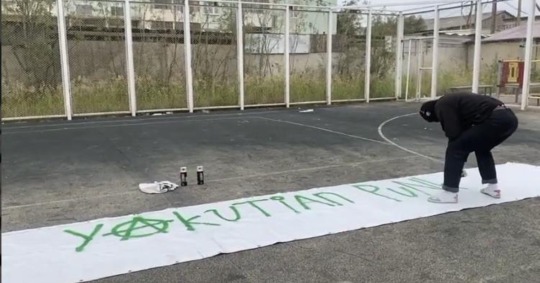
By Anonymous
Anti-war movements in Russia immediately appeared at the onset of Russia’s invasion of Ukraine. Notably, these initiatives were and are by and large driven by preexisting feminist organizations (The Social Democratic Alternative, Eighth Initiative Group, Eve’s Ribs, the Agasshin Project, and the Feminist Translocalities Projectto name a few) and Indigenous and ethnic minority groups founded in direct response to the war. While currently there is no sole, centralized movement uniting the country’s numerous Indigenous Peoples and ethnic minorities, the appearance of various anti-war organizations, media accounts, and content, and action points to a rather unprecedented impetus of collaboration and solidarity focused on condemnation of the Russia state’s actions.
Further unparalleled is the overt and widespread presence of anti-colonialist and anti-imperialist sentiment as activists and laypeople alike criticize Russia’s attack on Ukraine and probe into the federation’s enduring issues of coloniality in quotidian life (racism, discrimination, xenophobia, and the violence they encourage). The invasion of Ukraine is not new or covert; rather, it represents the next steps in a long and ongoing history of Russian colonial understanding of a sovereign Ukrainian nation and distinct Ukrainian culture as a threat needing mitigation. These anti-war, staunchly anti-colonialist, and Indigenous-led initiatives are small in number but increasingly outsized in influence. From the use of native languages in anti-war campaigns to overt castigation of Russian chauvinism, these initiatives point to resistance to both the ongoing war and colonial policy. Their importance cannot be overemphasized since their efforts contribute to a better understanding of, and subsequently, better capacity for dismantling Russian coloniality.
Russia’s claims that it is fighting “neo-Nazis” in Ukraine is a blatant distortion of history, and the irony of this claim is far from lost on many Indigenous Peoples of Russia who grew up in a society steeped in Russian colonialism and who witness growing ethnic Russian nationalism (often abetted by right-wing and neo-Nazi sentiment) on societal and institutional levels (e.g., ethnic Russian nationalism enshrined in the federal constitution since 2020).
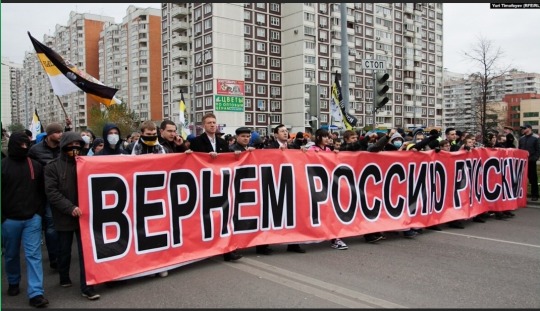
Image: Russian ultranationalist march in the "Russia March" in Moscow on Nov 4, 2011. The banner they carry reads "Return Russia to [ethnic] Russians". Yuri Timofeyev for RFE/RL.
Anti-war movements like the Free Buryatia Foundation––the first anti-war initiative started in response to Russia’s invasion of Ukraine and on behalf of an ethnic group––emphasize this paradox and use the current conflict to advocate for a reckoning with historic racism and imperialism within Russia’s own borders. The objective of The Free Buryatia Foundation(Buryats Against the War) is twofold––to fight against the war on Ukraine and to “solve the problem of racism and xenophobia in Russia”. Founder and president of the fund, Alexandra Garmazhapova, says such an organization was needed for a number of reasons: the disproportionate number of Buryat soldiers dying in the war, the overrepresentation in media of Buryats as the main perpetrators of violence, and the latent systemic factors that usher Buryats into military service.
“Our region has been the leader in losses since the very beginning of the war, and it was important for us to declare that we are Buryats, and we are against the war. We consider the war with Ukraine xenophobic, because if Russia had a tolerant society, the idea of ‘denazification’ of Ukraine…would not find support among Russians. The Indigenous Peoples of Russia have been and are being subjected to ‘denazification’, which in reality is complete Russification. We understand what it’s like to have your language and culture banned… Residents of ethnic republics who go to Moscow and St. Petersburg face xenophobia and racism… But at the same time, military personnel from [the ethnic republics] are sent to Ukraine to protect the ‘Russian world’,” Garmazhapova said in an interviewin July.
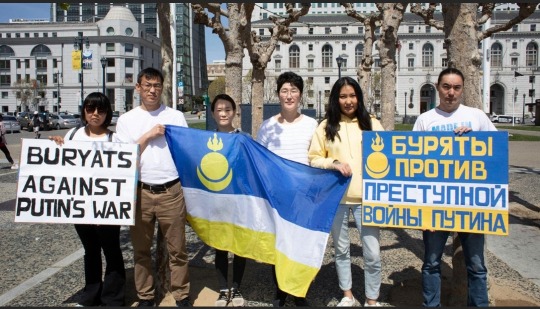
Image: Activists at a rally against the war in Ukraine in San Francisco holding signs that read "Buryats against Putin's [criminal] war" and the flag of Buryatia. Courtesy of Alexandra Garmazhapova's Facebook page.
The Free Buryatia Foundation tracks statistics on losses during the war, provides legal advice to help military personnel terminate their contracts, shares credible information to combat propaganda and misinformation, and strives to prevent Russian servicemen from going to Ukraine. The organization is very active on social media sites and regularly collaborates with specialists, activists, and other anti-war initiatives on live-streamed discussions, data collection and sharing, and crowdsourcing.
Most of the Free Buryatia Foundation’s team resides outside the Russian Federation, which shields them from Russia’s growing restrictive legislation, namely “fake news” laws, which criminalize the dissemination of false information about the Russian army and is used by the state to censor, detain, and imprison those who oppose the war. For that reason, there are no large-scale Indigenous-led anti-war organizations or groups based in Russia. Disparate groups and media accounts exist though they tend to maintain anonymity and much of their activism work is shared or takes place on Instagram (only accessible with use of a VPN) and Telegram. These include, but are not limited to the Sakha Pacifist Association, New Tuva Movement, and Asians of Russia(which existed prior to the war but shifted its focus to information about the war and protests), which share information specific to their respective regions in addition to sharing information among each other.
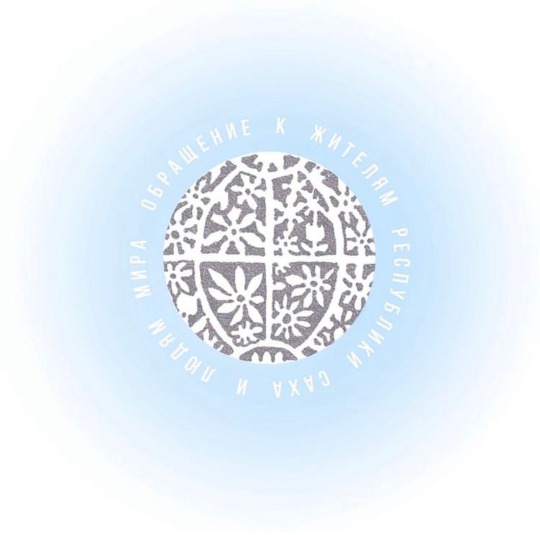
Image: Symbol of the Sakha Pacifist Association with text reading "An appeal to the residents of the Sakha Republic and the people of the world." Courtesy of https://www.instagram.com/sakha_pacifist_association/

Image: A post from the New Tuva Movement's Instagram page with text reading "Tuvinians against war!" Courtesy of https://www.instagram.com/new_tuva/
Indigenous individuals are actively engaged in anti-war actions though they are targeted by the Russian Federal Security Service and the Center for Combating Extremism (unit in the Ministry of Internal Affairs). The social media pages for various groups often crowdsource funding these activists need for legal aid. While the groups are not organized or affiliated, through their sharing of each other’s posts and through collaborations, they’re forming a kind of network––one that is able to exist under the current Russian state. Through posts on social media are seemingly low-impact, these groups are harnessing social media as a tool to disseminate information restricted by the state and state-run media and building networks on platforms that are relatively accessible.
There is no single position towards the war among Russia’s different Indigenous groups. These groups are often asked how individuals, who carry out demonstrations with signs saying “Tuvinians against the war”, or nameless admins, by using names such as Sakha Pacifist Association or New Tuva Movement, are able to speak for an entire people group. “These action[s] raise the rebellious spirit of the people. [They’re] very important demonstrations and actions for the entire people, as well as a message to the whole world,” wrote sakha_vs_war. The evocation of one’s nationality or cultural background is yet another tool for appealing to the public. The state and regional governments also utilize this tool in their co-opting of national cultures broadly, and of organizations such as the Russian Association of Indigenous Peoples of the North (RAIPON) and the Buddhist Traditional Sangha Center of Russia specifically, in support of hostilities against Ukraine. Identity, language, and culture are effective tools for anti-war movements in this particular case as initiatives consistently underline the imperial nature of this current war.
Given Russia’s history and continuing legacy of colonial language policy inherited from the Russian and Soviet empires (which systematically afforded/s primacy to the Russian language at the expense of native languages), anti-war slogans in Indigenous languagesare part of reclamatory cultural education which is, at its core, anti-war as it is a struggle against colonialism. The struggle around national languages in Russia is inextricably tied to state-sanctioned xenophobia and Russian supremacy. State language policy has become increasingly restrictive on native language education as Putin proclaimed in 2017 that Russian “the natural spiritual framework of the country” and that “everyone should know it”. Then, in 2018 three amendmentswere made to Law No. 273 “On Education in the Russian Federation,” which made Russian language learning compulsory at the expense of native languages. National or republican sovereignty movements of non-Russian, and overwhelmingly Indigenous, ethnic groups are thus intimately intertwined with language and cultural sovereignty, making language and culture significant areas the state and its security forces carefully scrutinize. Therefore, with this context, struggles for regional authority or autonomy and the anti-war struggle are innately linked.

Image: Anti-war poster with text in the Buryat language. By Yumzhana Sui for Agasshin.
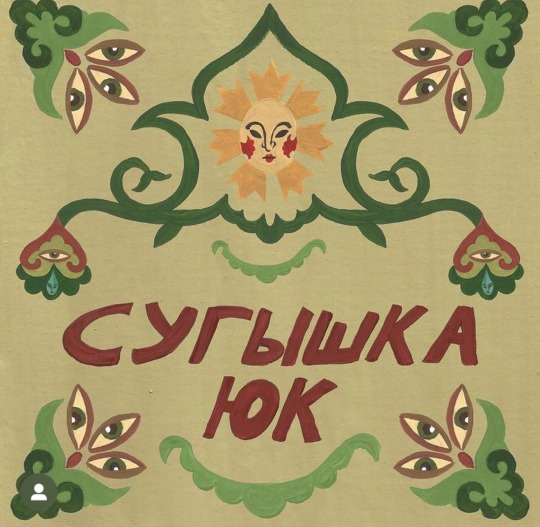
Image: Anti-war poster with text in the Tatar language. By Alisa Gorshenina for Agasshin.
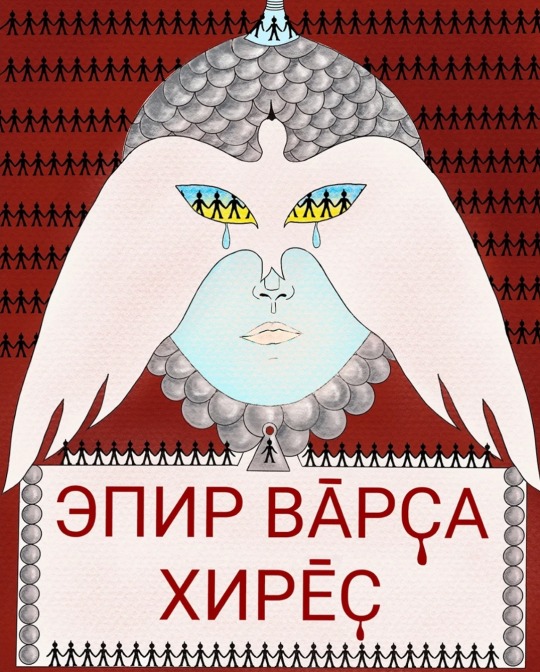
Image: Anti-war poster with text in the Chuvash language. By Polina Osipova for Agasshin.
For many activists, printing and disseminating anti-war messages in Indigenous languagesis not only symbolic of the resistance against the colonial Russian state, but also a rallying call to compatriots who might support the war or who do not openly oppose it. The Agasshin Project published a series of anti-war postersin Indigenous/national languages created by speakers of the languages (Buryat, Kalmyk, Udmurt, Chuvash) since anti-war activities in Indigenous languages “can be instruments of resistance to both the current war and colonial politics”. Aikhal Ammosov, a Sakha musician and activist, has been tried twice and is awaiting a third trialfor his anti-war picketing and performances in Sakha, Russian, and English. Ammosov was first fined for “hooliganism”, then for “discrediting the Russian armed forces”, and he currently awaits trial and could possibly face up to three years in prison for his most recent art performance involving a banner reading “Yakutian Punk Against WAR”.

Video still posted on Ammosov's Instagramaccount in which he spraypaints a banner with the text "Yakutian punk against war."
Following Russia’s February 24, 2022 invasion of Ukraine, activists around the world began publishing texts about colonialism, racism, and violence in Russia with fervor. Though these activists and groups are far from monolithic and cater to regional, historical, and culturally specific needs, these ideas spread and grow horizontally across the sphere of Russian influence, allowing for grassroots collaboration, collectivization, and support to grow.
#indigenous#indigenous russian#culture#indigenous russia#russia#important#colonization#fypシ#fypage#landback#Tuva#Sakha#Yakutia#Baryutia#indigenous people#indigenous resistance#indigenous rights#powerful
232 notes
·
View notes
Text
September 25th, 2022
The cries for help of Russia's national minorities: "We will stop existing"
"In small villages, with two or three streets, they have taken all the men" • Putin's draft mobilization punishes regions like Yakutia, Buryatia and Dagestan.
On the day after declaring partial mobilization in Russia, a member of the Duma [Russian Parliament] and ex-mayor of Jakutsk, in Siberia, protested that the number of reserves that each region has to send to the front [of the war in Ukraine] didn't match. She asked why regions like Novosibirsk only mobilize 0.27% of the men between ages 20 and 59 and, at the same time, Yakutia has to mobilize 1.66%. In addition, she added, why are precisely the most disadvantaged towns of the north of Yakutia where the proportion of men called to war is higher? "In villages of the Artic, with 300 inhabitants, they take 47 men. I know what it means to live in the north at -55°C [-67°F] and, without the men, families will have a very hard time. What is the logic behind these numbers? What kind of proportionality are we talking about?"
Yakutia, located north of the permafrost and almost 8,500 km away from Moscow, is a land rich in natural resources (diamonds, uranium, hydrocarbon...) and the immigration of workers for the extraction businesses has left Yakuts and Evens, the indigenous peoples, as a minority in the cities of the centre and south of the Republic. On the other hand, they are the majority in the towns of the north, from which they are now being sent en masse to the frontline.
We have talked to Aanis, a girl from a town of 500 inhabitants where 35 men have been called to war: "They've taken almost all young men from the town, of local ethnicities (Evens and Yakuts). It was very unexpected, nobody could have seen something like this coming. Before the mobilization, people from the town were not interested in the war, it's hard enough to survive. We were worried about everyday problems: hunting, how the vegetables were growing... Now everything has changed, we are shocked."
Nikolai, a man from a village in the north of Yakutia, answers resolutely when we ask what has happened: "We had never seen before what is happening now, not even in the Second World War. They have sent all the native men to the front." I ask him for more details: "My village is inhabited only by Yakuts and Evens. We're less than 500 people, out of which only 154 are of working age, including women. They have called to the front 65 people, almost all the men between ages 18 and 60." He adds that families don't know how they will survive this winter. "It reaches -60°C [-76°F], and we don't have centralised heating or water pipes. We use ovens to warm up and it's usually men who take care of that. We live from hunting. Who will hunt now? What will we eat? Nobody knows."
I ask him why does he think the authorities have decided to take them and not others: "Because we live in remote and very small villages, with no Internet; there are no lawyers here or organizations that defend us. Many of us don't speak Russian or English. They probably calculated that mobilizing us would have little repercussion: very few people would notice the absence of some minorities, even if they disappear completely. In fact, there's already few of us left.
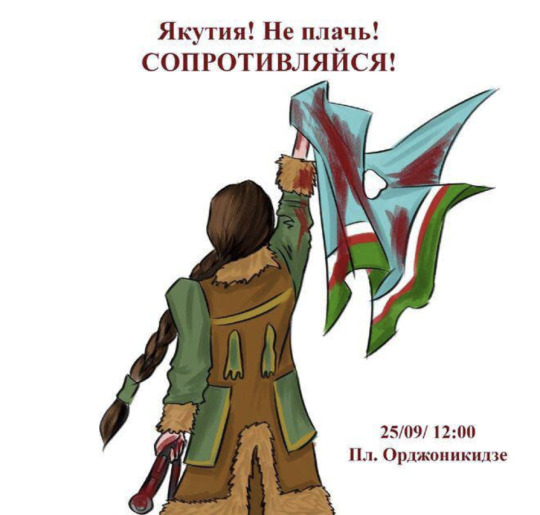
Poster calling for a protest of the Free Yakutia Foundation: "Yakutia! Don't cry! RESIST!"
In Yakutia, women have taken the streets to protest. They stand their ground. And they have done so, shouting "no to genocide!"
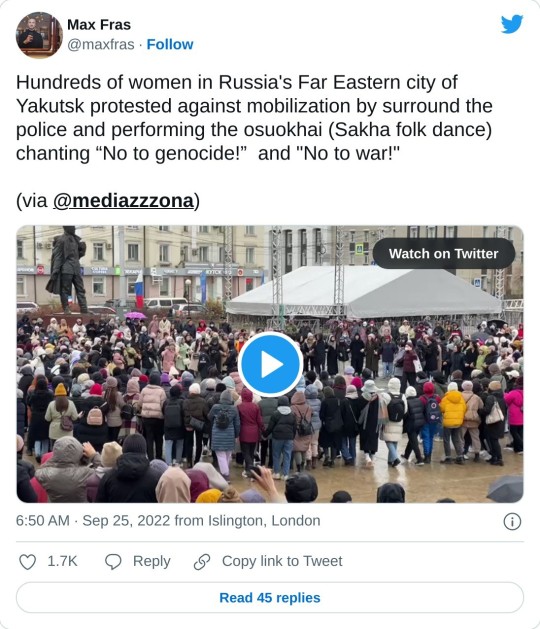
General mobilization in Buryatia
In Buryatia, a republic in the south of Siberia, bordering Mongolia, with a 35% native population of Mongolian origin (Buryats), their situation is just as harsh. "The mobilization in Buryatia is general, not partial", declares Aleksandra Garmazhapova, founder of a local NGO. Viktoriya Maladaeva, coordinator of the Free Buryatia Foundation, confirms it: "They're not calling up only reserves: they mobilize students, disabled people, and people who have never had any relation with the army. In small villages, with only two or three streets, they have taken all the men. There are families where they've called up the fathers and sons." She explains that many men were taken to the recruitment points during the night: "Then people started calling each other, and those who could drove their car to Mongolia. Others have hidden in the forests, in the taiga."
To answer to this situation, the ex-president of Mongolia (2009-2017) Tsakhiagiin Elbegdorj published the following message: "I know that since the beginning of this bloody war, the ethnic minorities that live in Russia are the ones that have suffered the most: the Mongols of Buryatia, of Tuva and Kalmykia have suffered. They have been used as cannon fodder. We, the Mongols, will welcome you with open arms and hearts. Our borders will stay open."
To the question of why she thinks Buryatia is disproportionately affected by the mobilization, Maladaeva answers without a doubt: "Because we are an ethnic minority and for Putin we are worthless [...] And that's the same in other "ethnic republics": right now we're getting calls from activists from Kalmykia, Chuvashia, Yakutia, Tuva... On the contrary, in the Irkutsk region (where there is a Slavic majority without notable minorities), there's silence, even though it borders us. Why?"
Dead in combat
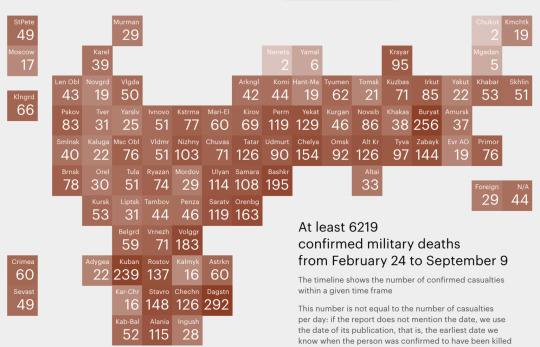
"Russian victims in Ukraine". Data compiled by Mediazona.
We must highlight that, until Putin signed the decree to mobilize reserves last Wednesday, going to fight in Ukraine was voluntary and paid. Those interested signed a contract with the Russian army and got paid a monthly salary between 130,000 and 200,000 rubles, depending on the region.
These salaries might not be much in Moscow, but they are a fortune in the most deprived areas. In the Russian capital city, the average monthly wage is about 115,009 rubles, three times the average monthly wage in Buryatia. If we look at unemployment rates, we see how it's 1.5% in Saint Petersburg while in Northern Caucasus republics, such as Ingushetia, it's as high as 30%. In the context of these economic inequalities, a result of highly centralized policies that center the economic wealth around the cities where political power resides and regulate the periphery to misery, it's no surprise that Buryats and Caucasians see an opportunity in an army wage, and knowing that in the worst of cases, if they die in combat, their families will receive (in theory) a compensation of 7 million rubles and a pension.
These economic reasons explain, in part, why the two regions with the most soldiers who died in combat in Ukraine are Buryatia and Dagestan (in the northern Caucasus). According to official data compiled by the Russian news portal Mediazona, 6,219 Russian soldiers have died in total in the war in Ukraine. From Buryatia, 256 have died (out of a total of 1 million inhabitants), and from Dagestan, 292 (out of 2.5 million inhabitants). These numbers contrast highly with the 17 dead soldiers from Moscow (12 million inhabitants) or the 49 deaths from Saint Petersburg (5 million inhabitants).
"We are the empire's trash"
Another factor that deepens the marginalization of minorities in Russia, that could have contributed to their disproportionate enlistment, is the prevailing racism in Russian society. Maria Viushkova, analyst of the Free Buryatia Foundation, declared in an interview: "The best alternatives in Buryatia for finding a job are either emigrating to South Korea or joining the army. For us, it's difficult to find work in other regions of Russia, where Buryats have to face discrimination and racism: they don't hire them, they don't house them, they limit their education. Often, Buryats who have tried their luck in other regions of Russia are forced to come back."
Aslan is a man from Kabardino-Balkaria, near Dagestan. He confirms that racism towards Caucasians is noticeable in Moscow, where he worked in some years: "It's constant. At work, first they looked badly at me, it took them a while to trust me. And when they knew me well, sometimes they spoke badly of Caucasians using a slur that they use to define us, "chernojopie" (black butts), not even realising I was there. In the subway, I have had problems with nationalists because of my looks. And my child has had quarrels with his friends for not being "Russian".
I ask him why he thinks it's them and Siberian minorities who are the most affected by this war. He's resolute: "Because we are the empire's trash to the Kremlin, and this is a way to get rid of us." And he adds: "But I don't understand why the Northern peoples don't rebel against Moscow, the empire has also wanted to destroy them. I think mobilization hasn't been as numerous in our republics in the Caucasus as it has in the Far East because they don't dare to, they know we'll stand up to them."
Aslan is probably right. The Caucasus is a potentially explosive region, where there was for years a Jihadist armed group made of young radicalized people with no hopes for the future. Authorities are not interested in feeding discontent and rage among these young people.
But in the Far East and in Siberia the situation is different, and the natives make a request of us. When I asked Nikolai, from the village in Yakutia that has been left with no young men, how could we help them, he said: "Please, report about the minority nations. If all men go to war, the genetic reserve of our people will be gone. In 20 years, or 40 years, our language will also go extinct. We will stop existing."
#war in ukraine#ukraine invasion#national minorities#ethnic minorities#russia#racism#yakutia#buryatia#dagestan#siberia#indigenous#evens#yakuts#tuva#kalmykia#kabardino-balkaria#caucasus#stateless nations#💬#genocide
237 notes
·
View notes
Text
Pathologic fans! I am calling on you all for something very important. If you have ever researched or referenced Buryat language or culture for your fanworks, or enjoyed someone else having done so, here is something you can do for the real people.
There’s an organization called Free Buryatia Foundation that is against the war in Ukraine and is currently trying to help draft dodgers escape to Mongolia, since Buryatia is one of the most heavily recruited regions. It’s a very poor part of Russia, and many people go into the army out of necessity. Unfortunately, this has led to the world seeing the Buryat people in a negative light because of the unconscionable acts of some of the members of the army. Help those Buryats who don’t want war and don’t want to be killed far from their home in a useless, stupid imperial land grab!
https://freeburyatia.taplink.ws
171 notes
·
View notes
Note
Hi,
I'm not indigenous so you can dismiss this as being overstepping if you want and you'd have every right to as a native person. I was thinking of maybe sending this on anon but anon messages are far easier to be construed as bad faith (I want to stress I'm not sending you this ask to dunk on you or ague with you or something) and also I think it's best to be honest so I'm doing this off anon.
I'll admit I was personally kind of uncomfortable at your Koryak Russia headcanon when I saw it, particularly because of the history regarding the Russian colonisation of Siberia, and especially because you chose the Koryaks in particular. However I am not indigenous so of course my opinion is definitely not one which should be amplified. I just want to give some context on Siberia/the Koryaks which might help explain further why the Koryak anon was upset.
Unlike the USA, Russia was an already established country when it undertook its colonisation of the far East. The indigenous Siberians were never originally "Russian" and had very little to no contact with Russians before the Russians invaded, and, again, Russia was an already established country at that point. The formation of Russia as a nation had nothing to do with engaging with Siberian indigenous, however Russia as we know it today with its huge landmass is a result of the later Russian colonisation of Siberia (Tsardom of Russia established 1547, Russia began its invasion of Siberia in 1580).
I didn't want to say anything because well I'm not a Koryak nor am I am indigenous Siberian nor am I indigenous at all however seeing as a Koryak spoke out, I just wanted to give a little more context of Russia's treatment of Siberian indigenous and Koryaks in particular. Again, I'm not sending this ask to shout at you, I just wanted to give further context.
Russia, as the previous Koryak anon pointed out, has been disproportionately mobilising indigenous Siberians, hence why the "Free Buryatia Foundation" was founded in an attempt to combat this, I've made some posts on this myself, including the recent Russian crack down on Siberian activists in which they've sentenced the leader of Free Buryatia to 7 years in prison.
Indigenous Siberian soldiers in Ukraine have also been frequently scapegoated for Russian war crimes committed in Ukraine, including by the Pope himself,
"The cruelest are perhaps those who are of Russia but are not of the Russian tradition, such as the Chechens, the Buryats and so on,” he said."
https://www.google.com/amp/s/amp.cnn.com/cnn/2022/11/29/europe/pope-francis-chechens-buryats-intl/index.html
Not only do indigenous Siberians face Russification, grapple with the Kremlins mistreatment of them and suffer from disproportionate mobilisation, but they are also being scapegoated for the brunt of Russian war crimes in Ukraine
https://www.media-diversity.org/the-savage-warriors-of-siberia-how-an-ethnic-minority-in-russia-came-to-be-unfairly-blamed-for-the-worst-war-crimes-in-ukraine/
To give some further context on Russia's treatment of the Koryaks in particular, not the full history but:
In the 1930s Koryak children were sent to boarding schools, where they were expected to adopt new ideas, including anti-religious views and criticisms towards their own traditions. This led to the loss of their natural way of life and traditions, with many Koryak settlements forcibly disbanded. In 1954, the teaching of the Koryak language was banned - this lasted for 2 decades. Affluent herders and shamans were executed during Stalins reign.
I can only find one source which says this so take it with a grain of salt , but nuclear testing. Apparently nuclear tests in the 1950s and 1960s caused severe problems for the Koryaks. Radioactive contamination harmed their immune system. Reindeer-herders' bones contain significantly more lead and caesium, resulting in a surge in diseases. Again, I could only find 1 source for this which is why I said "apparently" however regardless of if this factoid in particular is true or false doesn't necessarily take away from Russia's overall mistreatment of them.
On the Koryak infant mortality rate: "Infant mortality is also very high..The highest rates recorded in official statistics are among the Koryak, at 52.6 per 1000" (Peoples of the Arctic: Characteristics of Human Populations Relevant to Pollution Issues)
The average Koryak lifespan at one point was less than 50 years and iirc it's still quite low.
When it comes to their fishing:
"In September 2014, the parliamentary assembly of Kamchatka Krai introduced a bill aimed at reconsidering the management of those territories that have been traditionally used by indigenous peoples. The bill set out a proposal to considerably reduce their area and to prevent indigenous peoples from cultivating the land in the south of the Kamchatka Krai region – a move that deprives many of the ability to maintain traditional livelihoods such as fishing."
https://minorityrights.org/minorities/koryaks/
I'm not trying to point a finger at you because I'm sure you did not have any bad intentions with your post especially because you yourself are native and I'm not so I would be seriously overstepping, and of course it's always amazing to see more indigenous rep and I myself have my own Siberian ocs, but I just wanted to try and give some further context as to why perhaps the Koryak anon was upset at your depiction, however again I'm not indigenous so my opinion on the matter holds a hell of a lot of less weight. You don't have to feel obligated to post this, I know it's a heavy subject, and again I'm not indigenous/native so you could just dismiss this all if you wish. I hope this didn't come across as me overstepping
I truly appreciate your taking the time to message me. I do not mind, as anyone who recognizes something is wrong should say something. Being native does not excuse my choices, so please don't feel bad for correcting me or adding context.
I mentioned my intentions in the anon's ask because I wanted them to know my making Russia Koryaki was not to erase these humanitarian injustices, but to see a character I adore as indigenous. No matter my intentions, I should have known better than to connect an oppressed native culture that I have no connection to, to the literal embodiment of its invader.
Your message is important to me and because you used multiple sources, I do want to share it as it is a great way for more people outside of Russia to know about the plight of Koryak people. To the anon, I altruistically apologize for my depictions.
7 notes
·
View notes
Note
Hello. I've been following you for a while and I know that you organize fundraisers to help those in need. That's why I want to ask. What is happening to Buryatia and why did you decide to help this particular republic?
Hello! Thank you for following me! <3
Before I start, sorry if my English is not the best. I'm still learning and improving. If you don't understand something I wrote, please ask me in the comments and I will clarify.
Yes, for now I'm cooperating for a fundraiser for Maria. Her mom is going through cancer treatment and the situation is not the best.
On the other hand, I also shared a fundraiser (which is not organized by me) from Free Buryatia.
Free Buryatia is an organization created in 2022 to help those who were against the Russian-Ukraine war. This foundation speaks about the systematic abuse the Buryats are experiencing during this war, as they are the minority which death toll is the highest in all the Russian Federation.
I must say other minorities are also in a similar situation. Tuvans, Yakuts, Dagestanis... all the minorities (and ethnic russians from rural places as well) are being drafted in mass to the frontlines, while the muscovites are not.
Also, the drafted men sometimes need to buy their own equipment, as the equipment given by the army is not enough for facing the harsh winter, or secure enough. This means only those who can afford to pay for their own weapons, boots and everything will survive. And who are those that can afford it? The muscovites....
Of course a lot of them have tried to fee away from the Russian Federation (a lot are right now in Mongolia and Kazakhstan, for example) but others are facing trials for trying to escape. Free Buryatia provides lawyers for them, and they have also done a great work by sharing everything that is happening with us.
Sorry for the long post! If you want to know more you can DM me. I don't bite :)
If you want to read more/donate, here is their website:
Here is an useful article as well:
#buryatia#russian imperialism#ukraine#russian ukraine war#special military operation#siberia#indigenous russia
2 notes
·
View notes
Note
two interesting things I saw on twitter about Russia and Ukraine
"Retired US general: Ukrainian army could enter Crimea by mid-2023."
"A top Russian economist warns it will “die by winter.”"
thoughts on these two ideas?
I think, if Ukraine continues its military successes and if Russia continues to struggle with holding ground, then Retired Lieutenant General Ben Rhodes is probably not that far off.
I think Inozemtsev's analysis is probably pretty accurate - I'll quote the article below in full:
In the seven months since Russia invaded Ukraine, some have argued that the international sanctions levied against Russia weren’t strong enough as Russians continued to travel, shop, party—and generally lead a normal life.
Now, an action by Russian President Vladimir Putin could be the catalyst that brings the war home to Russians and plunges the economy into real catastrophe.
Last Wednesday, Putin announced a “partial” mobilization—Russia’s first mobilization decree since World War II—ordering 300,000 able-bodied men aged 18 to 30 in the military reserves to fight in Ukraine, sparking widespread protests across the country.
“I consider it necessary to make [this] decision, which is fully appropriate to the threats we face…to protect our motherland…to ensure the safety of our people and people in the liberated territories,” Putin said last week.
In the days that followed, Russian police arrested over 2,300 citizens for protesting, and tens of thousands of Russians have now fled the country to avoid the draft.
Now, Russian economist Vladislav Inozemtsev, the director of Moscow-based think tank the Center for Research on Post-Industrial Studies, is warning that Putin’s mobilization will have “truly catastrophic consequences,” including the death of the Russian economy and the downfall of Putin’s regime.
“The Russian economy is going to die by winter, I wrote in early March. Now I think I was right. The mobilization announced on Sept. 21 was a milestone that really divided Russian history into ‘before’ and ‘after’—an event that began the final countdown of Putin’s era,” the economist wrote on Sunday for Russian publication The Insider.
‘I don’t want to die for someone else’s ambitions’
Putin’s mobilization decree has already proved highly unpopular in Russia, prompting mass rallies and protest actions.
On Monday, a gunman opened fire at a military recruitment office in the Siberian region of Irkutsk, injuring one person. The gunman’s identity and motivation have not been disclosed. In Ryazan, a city 115 miles southeast of Moscow, a man set himself on fire, shouting that he didn’t want to fight in Ukraine. Over the weekend, at least 400 people—mostly women—protested in Yakutsk’s city centre, telling police to “let our children live.”
Several reports from independent media publications and researchers note that the Kremlin is likely aiming to draft over 1.2 million men to fight in Ukraine—four times more than the 300,000 the government says it’s recruiting. The Kremlin’s press secretary Dmitry Peskov has denied this claim.
Police and recruitment officers have also rounded up students, after Putin specifically said that university students studying full-time would not be called up to serve in Ukraine. Meanwhile, antiwar activists have denounced the government for disproportionately sending ethnic minorities from its Siberian and Caucasus regions to fight in Ukraine. Almost half of the male population in Buryatia, an eastern Siberian region colonized by Russia in the 18th century, have been brought to military assembly points from rural villages, according to independent media reports.
“Mobilization is not partial…in Buryatia. Summons come to students, pensioners, fathers of many children, people with disabilities,” Alexandra Garmazhapova, president of the Free Buryatia Foundation, told CNN.
In a move that shows how far the Kremlin is willing to go to ensure its mobilization demands are met, Putin signed an additional law on Saturday that approves jail terms of up to 10 years for those evading military duty and up to 15 years for wartime desertion.
Catastrophic consequences
Prior to Putin’s mobilization decree, Inozemtsev agreed with predictions that Russia’s GDP would drop around 4–5% this year. But now he believes that Russia’s GDP will drop that much in October alone, and the “next months will only consolidate the trend. Now my spring forecast for a 10% fall seems almost too optimistic,” he said.
The Kremlin’s exclusive focus on mobilization and war efforts means that government funds will be directed to these initiatives at the expense of investment in business and the economy, the economist predicts.
Investments in business will begin to decline sharply, and the Moscow Stock Exchange could dip below 1,500 points before year’s end, Inozemtsev wrote.
“And all this doesn’t take into account…the inevitable new wave of [Western] sanctions that will be announced in the near future. We are talking about a much more radical-than-expected displacement of Russia from energy markets and a new wave of restrictions on the supply of critical [imports] for the country,” he said.
The “financial effects of mobilization—in the medium-term—will be significantly greater than the consequences of…the war in Ukraine,” Inozemtsev said.
In Russia’s poorer regions like Buryatia, the economic consequences will be disastrous, as “thousands of families will be left without income, and local medium and small businesses will simply die out,” Inozemtsev wrote.
Russia will also lose at minimum hundreds of thousands of men to the war’s frontline, and 3 to 4 million more will “disappear” from the labor market,” he wrote. In Russia’s wealthier cities like Moscow and St. Petersburg, residents generally have more resources to leave the country. But Inozemtsev predicts that army officers in the next few days will start serving recruitment papers at people’s workplaces, leading many to quit, or simply not show up at their offices, to avoid getting a summons.
“This will be the strongest blow to the economy. Several million people will prefer to quit their jobs so as not to [serve] in the army. Meanwhile in large cities… the loss of even a few employees can cause disproportionate damage to the economy. Russia is the economy of large cities and companies,” he said.
22 notes
·
View notes
Text
Daily Wrap Up September 22, 2022
Under the cut:
Russia will on Friday begin its plan to annex around 15% of Ukrainian territory via referendums in four regions controlled by Russian forces, a move the West says is a gross violation of international law that significantly escalates the war
Summons delivered to eligible men at midnight. Schoolteachers pressed into handing out draft notices. Men given an hour to pack their things and appear at draft centres. Women sobbing as they send their husbands and sons off to fight in Russia’s war in Ukraine. The first full day of Russia’s first mobilisation since the second world war produced emotional showdowns at draft centres and even signs of protest. And it appears Russia could be considering far more than the 300,000 new conscripts claimed by the defence minister, Sergei Shoigu
The head of Ukraine's military intelligence said on Thursday the percentage of released Ukrainian prisoners of war who had suffered torture while in Russian detention was "rather high"
“Russia will on Friday begin its plan to annex around 15% of Ukrainian territory via referendums in four regions controlled by Russian forces, a move the West says is a gross violation of international law that significantly escalates the war.
After nearly seven months of war, and a critical battlefield defeat in northeastern Ukraine earlier this month, President Vladimir Putin explicitly backed the referendums after the Russian-controlled regions lined up to ask for swift votes to join Russia.
The self-styled Donetsk (DPR) and the Luhansk People's Republics (LPR), which Putin recognised as independent just before the invasion, and Russian-installed administrations in the Kherson and Zaporizhzhia regions will hold votes.
The voting, which the West and Ukraine says is a sham, is due to begin on Friday and will end on Tuesday, with results expected soon afterwards.
Russia will formally annex the areas after the results.
"The Kremlin is organizing a sham referenda to try to annex parts of Ukraine," U.S. President Joe Biden told the 77th Session of the United Nations General Assembly.
"Ukraine has the same rights that belong to every sovereign nation. We will stand in solidarity with Ukraine," said Biden, who cast the war as part of a global contest between democracy and autocracy.
Ukraine, whose post-Soviet borders Russia recognised under the 1994 Budapest Memorandum, says it will never accept Russian control of any of its territory and will fight until the last Russian soldier is ejected.”-via Reuters
~
“Summons delivered to eligible men at midnight. Schoolteachers pressed into handing out draft notices. Men given an hour to pack their things and appear at draft centres. Women sobbing as they send their husbands and sons off to fight in Russia’s war in Ukraine.
The first full day of Russia’s first mobilisation since the second world war produced emotional showdowns at draft centres and even signs of protest. And it appears Russia could be considering far more than the 300,000 new conscripts claimed by the defence minister, Sergei Shoigu.
One woman in a village in the Zakamensky region of Buryatia, eastern Siberia, said she first felt something was amiss when the dogs began barking at about midnight.
In a community of 450 people, the village head was walking from house to house, seeking to hand out more than 20 draft notices. As men gathered before departing the next morning, she said, some drank vodka, while others hugged and told each other to stay safe. Women cried and made the sign of the cross over the small minibus that carried them away.
“It’s not a partial mobilisation, it’s a 100% mobilisation,” said Alexandra Garmazhapova, the president of the Free Buryatia Foundation, an activist group that has reported on the draft in the region. In the past day, she said, she and her colleagues had received and identified more than 3,000 reports of povestka, or draft papers, being delivered in Buryatia within just 24 hours of Vladimir Putin announcing the draft.”-via The Guardian
~
“The head of Ukraine's military intelligence said on Thursday the percentage of released Ukrainian prisoners of war who had suffered torture while in Russian detention was "rather high".
Kyrylo Budanov was speaking at a news conference a day after a prisoner swap was agreed between Russia and Ukraine involving almost 300 people, including foreigners.
Some of the Ukrainian POWs released by Russia were currently receiving rehabilitation in hospital in Ukraine, the country's interior minister, Denys Monastyrskyi, told the same news conference.”-via Reuters
21 notes
·
View notes
Photo

Journal du vendredi 13 janvier 2023.
Vents d’Est : avril 1993-Avril 1999.
Les minorités dans l’ex-monde communiste d’Europe de l’Est après la chute de l’empire soviétique. Je vais dans ce journal vous présenter dans le désordre des photos de ce travail initié en 1993 et terminé en 1999.
Le livre Vents d’Est, publié en 2000 avait été conçu en quatre parties, les quatre saisons, métaphores de la vie qui passe. L’hiver regroupait les minorités en lutte ou en proies à des discriminations, le printemps accompagnait les minorités qui commençaient à s’en sortir avec une démocratie encore balbutiante et des portes qui s’ouvraient vers un futur, l’été et le bonheur retrouvé, ou tout simplement trouvé, et l’automne encore incertain avec des gouvernants qui se servaient des minorités comme d’une monnaie d’échange, donnant donnant, politique oblige.
Les Tatars de Crimée étaient dans le printemps, espoir de jours meilleurs qui semblaient se profiler dans un ciel rempli des lumière de la liberté.
Avec la prise de contrôle de la Russie sur la Crimé en 2014, et en 2022 la guerre en Ukraine, c’est l’hiver qui revient en force avec son lot d’incertitudes.
Le gouvernement russe recherche avant tout de la chair à canon en faisant appel à des peuples minoritaires.
Alors que Vladimir Poutine a annoncé une mobilisation partielle des forces de réserve russes pour aller combattre sur le front ukrainien, des ONG alertent sur une surmobilisation de certaines minorités.
C'est le cas de SOS Crimée (KrymSOS), qui dénonce la proportion de Tatars appelés en Crimée, ce territoire annexé par la Russie en 2014. 90% des convocations envoyées dans cette région leur auraient été adressées, selon des estimations préliminaires citées par l'organisation, alors qu'ils ne représenteraient que 13 à 15% de la population de cette région.
"Une telle ampleur de la mobilisation peut conduire à un génocide caché du peuple tatar de Crimée" dénonce Yevgeny Yaroshenko, analyste de SOS Crimée.
"Les Tatars de Crimée représentent le segment de la population le moins loyal à la Russie, et il était clair qu'ils étaient très soutenus par les récents succès militaires ukrainiens. Maintenant, ils sont punis", analyse pour le journal britannique Tamila Tasheva, cofondatrice de SOS Crimée et représentante du président ukrainien en Crimée.
"Ils ont d'abord essayé de nous acheter, puis ils ont essayé de nous réprimer et maintenant ils voient la mobilisation comme un moyen d'essayer de se débarrasser simplement de nous", a-t-elle ajouté.
Même constat en Bouriatie, où l'association Free Buryatia Foundation constate non pas "une mobilisation partielle" mais "une mobilisation à 100%". La présidente de l'organisation a en effet indiqué au Guardian avoir "reçu et identifié plus de 3000 documents livrés en Bouriatie dans les 24 heures suivant l'annonce du projet par Vladimir Poutine."
Photo du journal d’aujourd’hui : Jeunes filles s'apprêtant à danser. Fête à Bakhchysaray pour la venue du président de la Turquie, Mr Demirel, le 23 mai 1998.
3 notes
·
View notes
Text
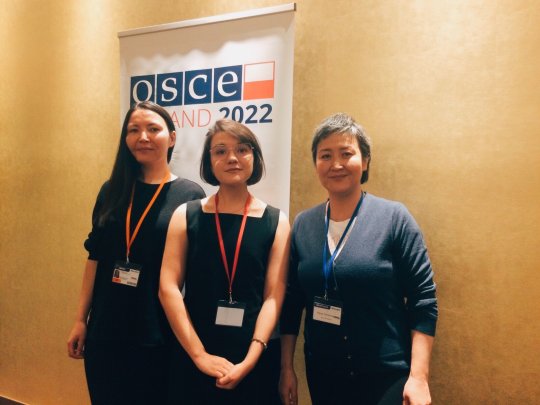
The future of decolonized Russia is female.
Alexandra Garmozhapova of Free Buryatia Foundation, journalist Leyla Latypova and Raisa Zubareva of Free Yakutia Foundation.
#non-russian#indigenous russia#indigenous russian#anti-war#Buryatia#Sackha#the future is female#decolonize#decentralized#activist#activism#Tatarstan#Bashkortostan
1 note
·
View note
Text
The Russian state using ethnic minorities as cannon fodder - with a focus on Buryats
Article written in 2022, update on the Free Buryatia Foundation in September 2023 given at the end of the post.
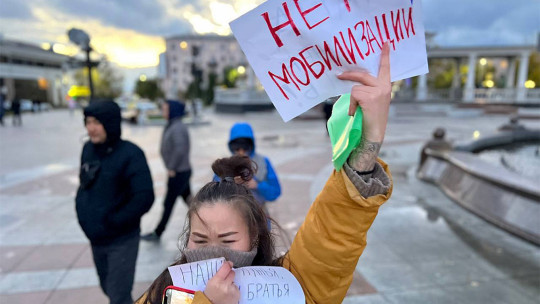
Putin announced on October 14th 2022 that by the end of October, his partial mobilisation process would be complete
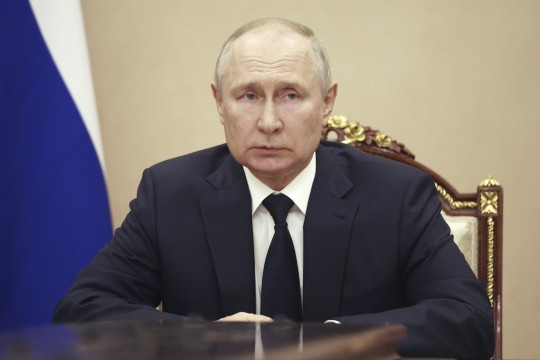
The recruitment target was 300,000. 222,000 were recruited, and it was claimed that there'd be no more plans for future recruitment
The mobilisation process soaked nation wide outrage which lead to mass protests.
It drew in criticism from some of the Russian political elite
The mobilisation process disproportionately affected ethnic minorities/impoverished regions (many impoverished regions have a high ethnic minority population)

Tuva Republic
Regions that held high populations of ethnic minorities bared the brunt of war-related deaths.
Both Ukrainian media and authorities have levelled accusations at Russian ethnic minorities - that they committed war crimes in Bucha, Ukraine
This accusations was made in May 2022 by Lydmyla Denisova, Ukrainian ombudsman for human rights

Buryats and Chechens were being accused of this
This was a form of scapegoating (not to say they 0 ethnic minorities have committed war crimes in Ukraine of course)
The Free Buryat Foundation investigated this and produced a report that challenged the notion that Buryats were ever sent to Bucha, let alone being responsible for the war crimes committed
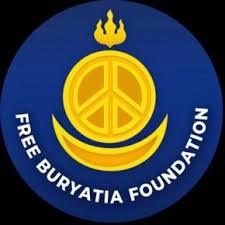
Victoria Maladaeva is the vice president of the Free Buryatia Foundation.

She said:
Dagestan, Tuva Republic and Buryatia Republic have the highest death tolls
Moscow, with 17 million, had >50 deaths.
Buryatia with only 980,000 had 364
A Buryat is 7.8 x more likely to die in the war compared to an ethnic Russian.
A Tuvan is 10.4x more likely
The biggest losses were at the beginning of the war and numbers gradually decreased.
Mobilisation was first and foremost carried out in ethnic republics
The day Putin announced this, authorities came to Buryatia at night, went into people's homes and took them from their beds.
No one was given draft notices
They even took men with multiple children, men from the same family
Endangered ethnic groups reside in Dagestan

There are very small communities of those people with populations of around 13,000
Despite this, those minorities were still drafted
There are also very small communities in the Sakha Republic.
They are so remote, helicopters are needed to be called for medical treatment
They almost never come because of how remote these communities are
Funnily enough, helicopters came immediately to draft those people upon Putin's announcement
Putin is a Russian imperialist through and through
None Russians are treated like second class citizens
Russian cultural chauvinism is seen even in small things - such as names
Putin would frequently mispronounce Kazakhstan's president's name. If you have an ethnic Buryat name for example, Russians are reluctant to use it, instead assigning you an "easier" Russian name

Kassym-Jomart Tokayev
Unfortunately, many of the people of Buryatia believe in the Russian narrative about Nazi ideology in Ukraine
It is one of the missions of the free Buryatia Foundation to help Buryats understand that this is Russian propaganda
The focus on Buryat/ethnic minority war crimes has a racial element
When an ethnic minority commits a war crime, their ethnicity is singled out
It should not matter the ethnicity of a war criminal
78 Buryat soldiers from the 11th air assault brigade were barred from terminating their contract
They were imprisoned in Luhansk.
Only Ilya Kaminskiy returned. The fate of the other men is unknown
The Free Buryatia Foundation knows they cannot help everyone but they do their best. They help people in terminating their contracts for example and have been quite successful in this.
The Free Buryatia Foundation was established to counter Russian propaganda and to protest the war.
People worldwide took an interest to this, so they founded the free Buryatia Foundation.
The Free Buryatia Foundation is the first ethnic anti war organisation in Russia
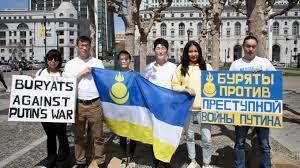
They aided in founding anti war organisations in other ethnic regions such as Tuva, Kalmykia, Udmurtia, Sakha
Many Buryats fled to Mongolia and Kazakhstan
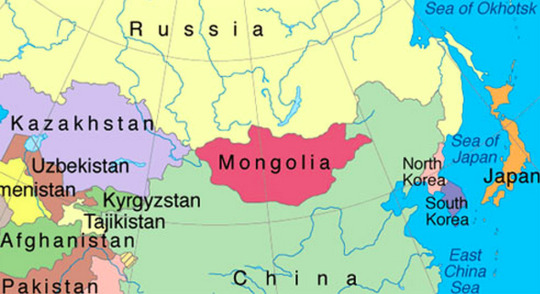
Some men were able to come back after being drafted, some were not
The economic situation for Buryatia is dire. It ranked 81st out of 85 of Russia's regions when it came to living standards
Buryats had to spend money on a list of supplies for war that Russia did not provide them
Very recently, on September 1st, Russia banned the Free Buryatia Foundation, labelling them as undesirable and anti Russian.
Here is the website for the Free Buryatia Foundation:
And here is where you can donate:
Please spread around or give what you can.
#Russia#Russian imperialism#russian colonialism#russian invasion#Ukraine#invasion of ukraine#russian invasion of ukraine#war in ukraine#Buryatia#Tuva#chechnya#Sakha#Yakutia#Kalmykia#Indigenous people of Russia#Asian Russians#indigenous russia#indigenous russian#Native Russia#Native Russians#Russian ethnic groups#Free Buryatia foundation#Free Buryatia#Anti Russia#Russian propaganda#human rights#Russian ethnic minorities
147 notes
·
View notes
Text
Russia’s Sending Its Ethnic Minorities to the Meat Grinder
Chaotic mobilization sparks renewed fears that the pain will not be shared evenly across Russia.
By Amy Mackinnon, a national security and intelligence reporter at Foreign Policy.
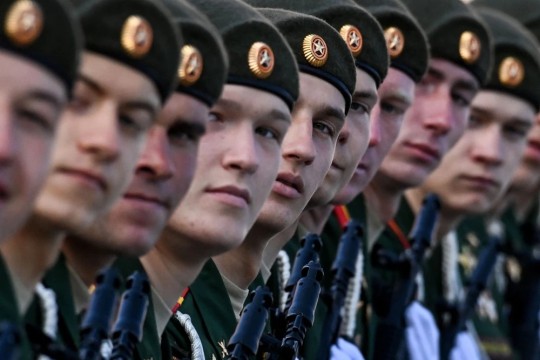
Russian servicemen gather at Red Square in Moscow on May 7, 2021, before a rehearsal for the Victory Day military parade.
SEPTEMBER 23, 2022, 4:26 PM
Russian President Vladimir Putin’s announcement of a partial military mobilization on Wednesday sent shockwaves through Buryatia, a mountainous republic in eastern Siberia some 3,500 miles from Moscow.
As military recruiters began knocking on doors with summons in hand and almost a dozen schools in the region’s capital have been transformed into conscription centers, activists say some men in remote areas have resorted to hiding in the forest while others flee the country, with lengthy lines reported at the country’s land borders.
“Today, Buryatia experienced one of the most terrible nights in its history,” Alexandra Garmazhapova, president of the Free Buryatia Foundation, wrote on Facebook on Thursday.
Although reports have emerged from across the country of men receiving military summons—including some of those arrested for protesting in Moscow—the intensity of the recruitment drive in Buryatia has further fueled suspicions that ethnic minorities are being sent to fight and die in Ukraine at disproportionate rates. The region is home to nearly 1 million people, some 30 percent of whom are ethnically Buryat and share close cultural and historic ties with Mongolia.
Over the past two days, reports have emerged of men being recruited from towns and villages across Yakutia, a large but sparsely populated region in northeastern Siberia that is home to a large population of ethnic Yakuts. According to local media, 4,500 men are expected to be recruited from the region. In Dagestan, a majority Muslim republic in southern Russia, local men can be seen arguing with an unidentified official encouraging them to enlist. “You are fighting for your children’s future,” said the woman.
“We don’t even have a present,” replies a man from the crowd. “What kind of future are you talking about?”
Owing to its history of empire and territorial expansion, Russia is home to more than 160 different ethnic groups, according to the country’s 2010 census. Ethnic and Indigenous groups made up 20 percent of the country’s population as of 2002.
Russian officials have been deeply secretive about their battlefield losses, which U.S. officials estimate could be as high as 20,000 deaths and which Ukrainian officials peg at more than twice that. Analysis by activist groups and the media have raised suspicions that ethnic minorities are dying at disproportionately high rates. The BBC’s Russian service examined reports of more than 6,000 confirmed battlefield losses and found that by the beginning of September, troops from Dagestan, Buryatia, and Krasnodar in southern Russia had lost the most soldiers—over 200 deaths from each region. By comparison, only 15 people from the Moscow region, which accounts for almost one-tenth of Russia’s population, had been killed in battle.
Russian regions are significantly poorer than western Russia. In Buryatia, where the average monthly salary is one-third of that in Moscow and St. Petersburg, the military offered local men the possibility of a stable salary. “The army for them before the war was a good way to earn money and take care of their mortgages,” said Natalia Arno, president of the Free Russia Foundation, who is originally from the region.
Units from Russia’s eastern military district—which encompasses Buryatia and large parts of Siberia, the most neglected of Russia’s military regions—led the assault on Kyiv in the early days of the war in some of the most intense fighting thus far. Sending troops from poorer and more remote regions also enables the Kremlin to avoid ruffling the feathers of wealthy city-dwellers.
“These people are less defended,” said Vasily Matenov, founder of Asians of Russia, which was launched on social media four years ago to gather Russians of Asian heritage. “If they were to start rounding up Muscovites, then everyone would hear about it.”
In a video address on Friday, former Mongolian President Tsakhiagiin Elbegdorj called on Putin to stop the war. “I know since the start of this bloody war, ethnic minorities who live in Russia suffered the most,” he said. “The Buryat Mongols, Tuva Mongols, and Kalmyk Mongols have suffered a lot. They have been used as nothing more than cannon fodder.”
Russia’s high rate of troop losses looks set to continue, with new recruits under the mobilization reportedly being offered just two weeks of training amid lingering questions about whether Moscow is able to equip hundreds of thousands of new soldiers.
In the wake of Russia’s invasion of Ukraine, new civil society organizations representing Russia’s ethnic minorities from Yakutia, Buryatia, and Kalmykia were established to protest the war and educate soldiers about their legal rights. The groups are “an absolutely new phenomenon,” Arno said.
Harassment and discrimination against ethnic minorities in Russia is commonplace, and many saw through the Kremlin’s claims that it was engaged in a campaign of “denazification” in Ukraine, Arno said. ”Many of them are saying Russia needs denazification.”
Since the mobilization was announced on Wednesday, the most active of these groups, the Free Buryatia Foundation, has been sharing information on social media about which countries Russians can travel to visa-free, assisting fighting-age men to flee the country as well as gathering data on conscription.
“They are taking any men right now. And it will happen everywhere in Russia; they’re just testing it in Buryatia,” said Victoria Maladaeva, vice president of the Free Buryatia Foundation.
On Wednesday, Russian Defense Minister Sergei Shoigu said 300,000 men would be called up in a partial mobilization of reservists—the first in the country since World War II.
The independent Russian newspaper Novaya Gazeta Europe, which was forced into exile after the war began, reported on Thursday that a classified paragraph from the presidential decree authorizing the mobilization could allow for up to a million people to be called for service, citing a source close to the Russian presidential administration. Putin’s spokesperson denied the claims.
Protests erupted across Russia in the wake of the conscription announcement despite the country’s draconian anti-protest laws. As of Friday, more than 1,300 people had been arrested, according to the independent monitoring site OVD-info. AvtoZak Live, another human rights monitoring group, reported that nine military recruitment centers had been set on fire since the mobilization was announced.
According to Russian officials and the county’s law on mobilization, only men with previous military service or relevant skill sets are to be called up, and students, people with more than four children, and those with certain health conditions will be exempt. But in the chaotic first two days of the mobilization, multiple reports have emerged of students and pensioners receiving summons. A father of five children from Buryatia with no previous military service was also called up, according to a video shared on social media by his wife, Yanina Nimaeva, a local journalist.
“I understand we need to send 4,000 people for the partial mobilization from our republic, but should there not be a limit to this?” she said in a video addressed to the region’s governor.
#indigenous#indigenous russian#indigenous russia#culture#russia#important#colonization#fypシ#fypage#landback#no to genocide#stop the genocide#Genocide#Ukraine war#russia ukraine war#ethnic minorities#russian imperialism#colonialism#Decolonize#fyp#Racism
14 notes
·
View notes
Video
youtube
⚡The Buryats are leaving en masse! SHOCKING DETAILS OF mobilization
24 Канал
Oleksandra Harmazhapova, president of the Free Buryatia Foundation, spoke about the mobilization of Buryats by Kremlin...
P.S. Interesting interview! It provides an interesting insight into life in Mordor. It should be added here that the leaders of the Free Buryatia Foundation somewhat naively imagines that some protection of minority rights or real autonomy is possible inside the Russian Federation sometime in the future! The only way for the "small" peoples to protect their existence and rights is the restoration of independence, the complete destruction of the Russian Federation. Even when Putler's regime falls, the new "liberals" will be a deadly threat to all small non-Russian nations...
1 note
·
View note
Text
On Sept. 21, Russian President Vladimir Putin announced a “partial mobilization” to replenish the country’s faltering ranks in Ukraine. The order has brought the exploitation of Russia’s ethnic minorities into harrowing focus. Despite the lack of reliable statistical evidence, numerous reports on Twitter and Telegram from the country’s ethnic republics—so-called because they nominally represent Indigenous ethnic groups—such as Buryatia, Dagestan, Kabardino-Balkaria, and Bashkortostan, paint a disturbing, if fragmented, picture of the impact the mobilization order has on Russia’s poorest and most vulnerable people.
Putin’s regime can send Buryats, Chechens, and Dagestanis to die in Ukraine because of centuries of violent colonial expansion. The first official Russian incursion into Siberia occurred in 1581, but the subjugation of the immense eastern region took centuries of military occupation, economic exploitation, and settler colonialism beforehand to accomplish. No less violent was Russia’s conquest of the North Caucasus, launched by then-Tsar Nicholas I in 1817, which led to decades of bloody conflict and genocide against the Circassian people.
The modern Russian state’s blatant disregard for non-ethnic Russian lives is the logical continuation of the imperial ideology developed in the 18th and 19th centuries. The most recent manifestations of Russian violence against the region are the First and Second Chechen Wars, in the 1990s and 2000s. “People remember what Russia did to Chechnya,” wrote Circassian-American Voice of America journalist Fatima Tlis over email. “It was a message to all other nationalities under Russian occupation.”
Experts do not know exactly how many men Russia has drafted in its “partial mobilization,” but evidence from local activists and social media suggests it is well above the 300,000 soldiers announced by Putin and that the hardest hit are not ethnic Russians—in whose defense the Kremlin claims to have launched its brutal invasion—but ethnic minorities. Even before Feb. 24, these community members, whom—due to structural and historical inequalities—are generally poorer and less connected than ethnic Russians, are more likely to be swept up in a conscription system than those with pull or money to do everything possible to avoid it.
Data collected by the independent Russian media outlet iStories shows that Buryats are among those most severely impacted by the mobilization order, stirring fear and desperation in the eastern Siberian republic. “Everyone is trying to leave but from today it is nearly impossible,” one ethnically Buryat woman outside of Russia told FP over Twitter, who asked not to be named for the safety of her family still in the country. “Men … are afraid to leave their villages; many have gone to the forests. There are rumors that [the authorities] will search the forests as well. There are also rumors that voenkomat [military enlistment office] staff are deleting the names of their relatives and adding those of random people.”
Despite Kremlin promises that the decree would only affect reservists with combat experience and that students would be exempt, the next day, reports emerged of students being pulled out of Buryat State University by Russia’s National Guard, of men in their 50s receiving draft notices, and of recruitment officers “combing through the villages” to draft any man they could find. These disturbing reports recall historical colonial trauma, wrote Alexandra Garmazhapova , founder of the Free Buryatia Foundation, over Telegram. “Buryats have faced monstrous repression. … During the Stalinist repressions in 1937, all the top leaders of the Buryat [Autonomous Soviet Socialist Republics] were shot or exiled to concentration camps. Thousands of people were arrested. There is not a single Buryat family that has not lost relatives because of these repressions.”
Dagestanis—whose mass anti-mobilization protests have made international headlines—are another ethnic minority bearing the brunt of the conscription drive. As of May, soldiers from Dagestan accounted for the largest number of confirmed fatalities on the Russian side. Images of Dagestanis, primarily women, bravely confronting police and recruitment officers have dented the traditional image of the republic as politically quiescent and pro-Putin.
Russia’s forced mobilization of its ethnic minorities has also already impacted relations with its neighbors. As the former Soviet Union’s so-called successor state, Russia has enjoyed continued cultural and political dominance in the region. Citizens from its “near abroad” continue to speak its language and flock to its cities for work and education. The invasion of Ukraine, however, has caused many of these countries to reevaluate their ties with the former imperial metropole. The mobilization order has catalyzed this process.
Kazakhstan, a former Soviet republic, has been distancing itself from Russia since Feb. 24. It was the first Collective Security Treaty Organization member state to rule out sending troops to join the “special operation” and, at the St. Petersburg International Economic Forum in June, Kazakh President Kassym-Jomart Tokayev reiterated in Putin’s presence that Kazakhstan would not recognize the so-called Donetsk and Luhansk People’s Republics as independent states. According to political sociologist Diana Kudaibergen, “Tokayev was clear in his June speech in St. Petersburg that his country supports Ukrainian territorial integrity. … He’d face great backlash if he agreed to any involvement [in the war] from his own people.” Kazakhstan’s interior ministry reports that as many as 200,000 Russians have entered Kazakhstan since its mobilization announcement, some moving on to neighboring Kyrgyzstan. Despite regularly experiencing racism and discrimination in Russia, Kazakhs themselves have shown remarkable compassion, with reports of free food and accommodations being offered to Russians fleeing the draft. Moscow can no longer count on the obedience of its former colony. “This support is given without an ethnic lens,” Kudaibergen told FP over Twitter. “Grassroots organizations in Kazakhstan are literally helping anyone from Russia, they don’t care about ethnicity.”
Mongolia—once a Soviet satellite state—has garnered widespread praise for its support of Russians fleeing the draft, particularly of Indigenous people from the Far East, with many private citizens self-organizing to provide food and shelter to those crossing the border. “We feel very akin to the Buryat people,” said Mongolian journalist Anand Tumurtogoo, highlighting the cultural similarities and cross-border family ties between Mongolia and the Siberian republic.
Sandwiched between two superpowers, the country has long sought to remain geopolitically neutral. “We have always wanted to say that we are the ‘Switzerland of Asia,’” Tumurtogoo said. “But when the war started, the intelligentsia and many people on social media demanded that the government to choose a side.” He added that, while Mongolian popular culture has traditionally portrayed them in a positive light, people are beginning to understand the negative stereotypes that ethnic Russians have of them. “I hope that this message comes across more,” he added. “Ethnic Russians don’t care about Mongolians—they see us as dirt.”
Telegram channels run by ethnic minority groups see the forced mobilization as deliberate imperial policy. On one channel, the Free Nations of Russia Forum—a platform calling for the decolonization of Russia—referred to the mobilization order as “part of the imperial policy of genocide that has been conducted against these [minority] peoples for centuries. Putin’s regime has declared war not only on Ukraine but on all peoples, regions, and citizens of the Russian Federation.” Similarly, Idel-Ural—a civic movement aiming for the independence of the peoples of the Volga region—posted: “The Nazi Empire decided to tell the whole world about its terrorist leanings. … Genocide of everyone and everything. This is the ‘Russian World.’”
The disproportionate mobilization of ethnic minorities is part of the same imperial ideology that dehumanizes and justifies the violence against Ukrainians. In Garmazhapova ’s words, “Putin is pursuing a consistent imperial policy. … [H]e wants to turn Ukraine into a colony of the Russian Empire, and the empire always throws national minorities into the meat grinder first.” The more widespread the belief among Russian ethnic minorities that they and Ukrainians are victims of Russian colonial violence, the more opportunities there will be for cross-border anti-colonial solidarity. Circassians outside of Russia, Tlis said, have already made the connection. “Circassians are especially enraged that Russia is forcing the descendants of the same people it drove to the verge of extinction to fight on its behalf in a genocidal war it has been waging to exterminate another innocent nation,” she wrote.
The forced mobilization of these communities is galvanizing anti-colonial sentiment and solidarity both within Russia and beyond its borders. Ukrainian President Volodymyr Zelensky appealed to this sentiment among Russia’s minorities, acknowledging in particular the protests in Dagestan. “Dagestanis do not have to die in Ukraine in a vile and disgraceful war of Russia—nor do Chechens, Ingush, Ossetians, Circassians, and any other peoples who came under the Russian flag.” Ukraine’s parliament is also spurring on this sentiment, just last week considering a draft law on the recognition of the Chechen Republic of Ichkeria—a short-lived de facto state born of the First Chechen War—with parliamentarian Oleksiy Goncharenko calling for “the right to self-determination of people enslaved and colonized by this prison of peoples: the Russian Empire in the form of the Russian Federation.” As rumors about border closures and a national crackdown swirl, one thing is certain: The cruel, colonial logic underpinning Russian society is deadly both at home and abroad. Dismantling it will be the work of generations.
17 notes
·
View notes
Text
Ethnic Minorities Hit Hardest by Russian Mobilization, Activists Say
https://www.themoscowtimes.com/author/leyla-latypova
By Leyla Latypova
22 hours ago
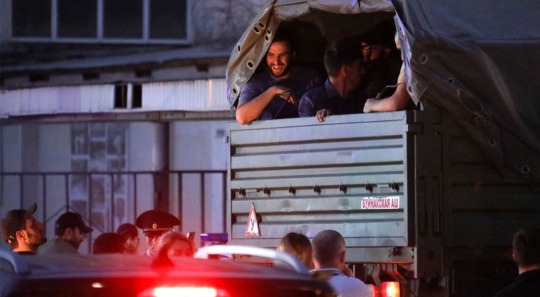
Mobilized men in Makhachkala, Dagestan.
TASS
Just hours after Russian President Vladimir Putin announced a partial mobilization for the war in Ukraine last week, a family in Russia’s majority-Buddhist republic of Kalmykia gathered to decide how to protect its four draft-eligible men.
“We thought my uncle would be drafted first and decided he would go to Kazakhstan… He left the next day,” the youngest man in the family from Kalmykia’s capital Elista told The Moscow Times.
Assured that his family was relatively safe, the man — a local activist who requested anonymity to speak freely — started helping conscription-age men to avoid “becoming cannon fodder” by fleeing abroad. But then his father received draft papers.
“I wasn’t able to convince my father to leave... I am going to the draft office tomorrow to bid farewell,” the activist wrote on social media Thursday.
“He is 47. He avoided the Chechen war, but not this one.”
Evidence from regional activists who spoke to The Moscow Times suggests that, almost a week into Russia’s mobilization drive, a disproportionate amount of the men being drafted come from Russia’s ethnic minorities.
Many of the ethnic republics that appear to have seen large numbers of men receiving draft papers — including the North Caucasus republic of Dagestan and Siberian republic of Buryatia — have already suffered heavy losses in the war in Ukraine.
“In Elista, they are planning to take 332 people, which is quite a lot for a city with a population of no more than 150,000,” local Kalmyk activist Daavr Dordzhin told The Moscow Times.
In the Siberian republic of Buryatia, one of Russia’s poorest regions, thousands of men — including recently discharged soldiers and those who initially refused to be sent to Ukraine — have apparently received call-up papers.
“All the young men we were able to save and bring back home are now being invited to go back into that meat grinder,” said Alexandra Garmazhapova, co-founder of the anti-war Free Buryatia Foundation that helps conscientious objectors.
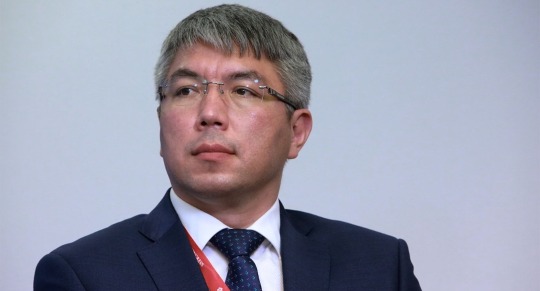
The governor of Buryatia, Aleksei Tsydenov.
Pavel Volkov / Roscongress Photobank
There are no official figures for the numbers of men mobilized in each Russian region, and The Moscow Times was unable to confirm numbers given by activists.
In Bashkortostan, an oil-rich Muslim-majority republic in central Russia, fathers of four and men over 40 years old are among those to have received draft papers, according to Bashkir opposition activist Ruslan Gabbasov
“I don’t know the exact numbers of people drafted, but they are sending out draft papers left, right and center,” he told The Moscow Times.
And in Crimea, which Russia annexed from Ukraine in 2014, the peninsula’s indigenous Crimean Tatars have apparently been hit particularly hard.
“Eighty percent of the draft papers for mobilization in Crimea were sent out to Crimean Tatars (Crimean Tatars make up less than 20% of the population of Crimea),” journalist and activist Osman Pashaev wrote in a post on Facebook last week.
Many activists have suggested mobilizingmore men from ethnic minorities far from Moscow and St. Petersburg is a way for the Kremlin to reduce the draft’s impact on major cities, where the chances of opposition protests are higher.
But many of these regions — which are generally poorer and more fertile recruiting grounds for the Russian army that can provide a stable salary and act as a social lift — also have a higher-than-average number of military veterans.
“A mobilization that focuses on recent veterans will… disproportionately affect regions where there are more military units,” military analyst Rob Lee tweetedlast week.
Perhaps because of the outsize impact of the draft on their communities, ethnic minorities have played a prominent role in anti-mobilization protests — often led by women — in recent days, with videos emerging of demonstrators blocking roads, scuffling with police and calling for peace.
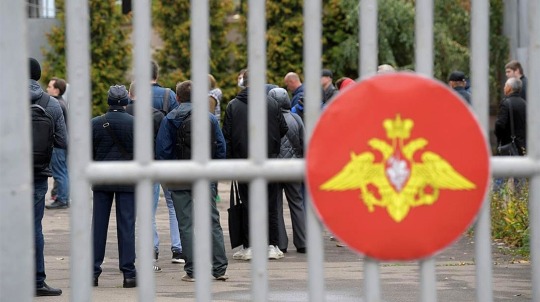
A military enlistment office in Russia.
Dmitry Lebedev / Kommersant
The ethnic republics of Dagestan, Kabardino-Balkaria and the Arctic republic of Sakha all saw significant protests over the weekend.
Demonstrators in Yakutsk, the capital of mineral-rich Sakha, organized traditional dances at a protest Saturday and were seenchanting “No to war!” and “No to genocide!” — a reference to the fact that mobilizing men from small ethnic minority communities will likely cause their population numbers to plummet.
And in Dagestan, protesters in the town of Khasavyurt blocked a key highway Sunday. Police fired in the air in an attempt to despers the rallies, according to videosfrom the scene.
Over 10 times more people were detained at anti-mobilization protests Sunday in Dagestan’s Makhachkala than in Moscow, accordingto protest monitoring group OVD-Info.
Like in most Russian regions, the mobilization drive in ethnic republics appears to be particularly intense in poorer, rural areas, activists said.
In the Caucasus republic of North Ossetia, “draft papers are distributed mostly in villages,” one local activist who requested anonymity told The Moscow Times.
And a similar tactic is used in Bashkortostan.
“They are taking ordinary boys from the districts and villages,” one eyewitness from Bashkortostan said in a message sent to the Free Buryatia Foundation that the group subsequently shared online.
Many activists blamed regional leaders keen to impress the Kremlin for the speed of mobilization in areas with large ethnic minority communities.
“The over-eagerness of the head of Buryatia, Aleksei Tsydenov, plays an important role,” activist Garmazhapova told The Moscow Times.
“If Vladimir Putin told him to do a pole dance, he would do it. And just as easily he will send young men from Buryatia to war... He doesn’t see them as people, he sees them as a means to achieve his [political] goals,” she said.
#indigenous#indigenous russian#indigenous russia#culture#russia#important#colonization#fypシ#fypage#landback#decolonize#russia ukraine war#indigenous rights#indigenous people#buryatia#bashkortostan#dagestan#russian imperialism#Genocide#Racism#Text#land back#War#russia ukraine conflict
6 notes
·
View notes
Text
Mariya Vyushkova (Free Buryatia Foundation) during Warsaw Human Dimension Conference (Helsinki Comission), OSCE. 28.09.2022.
#non-russian#indigenous russia#indigenous russian#anti-war#anti-war movement#no war#mongolic#Buryatia#Бурятия#Buryats culture#Культура Буряты
1 note
·
View note